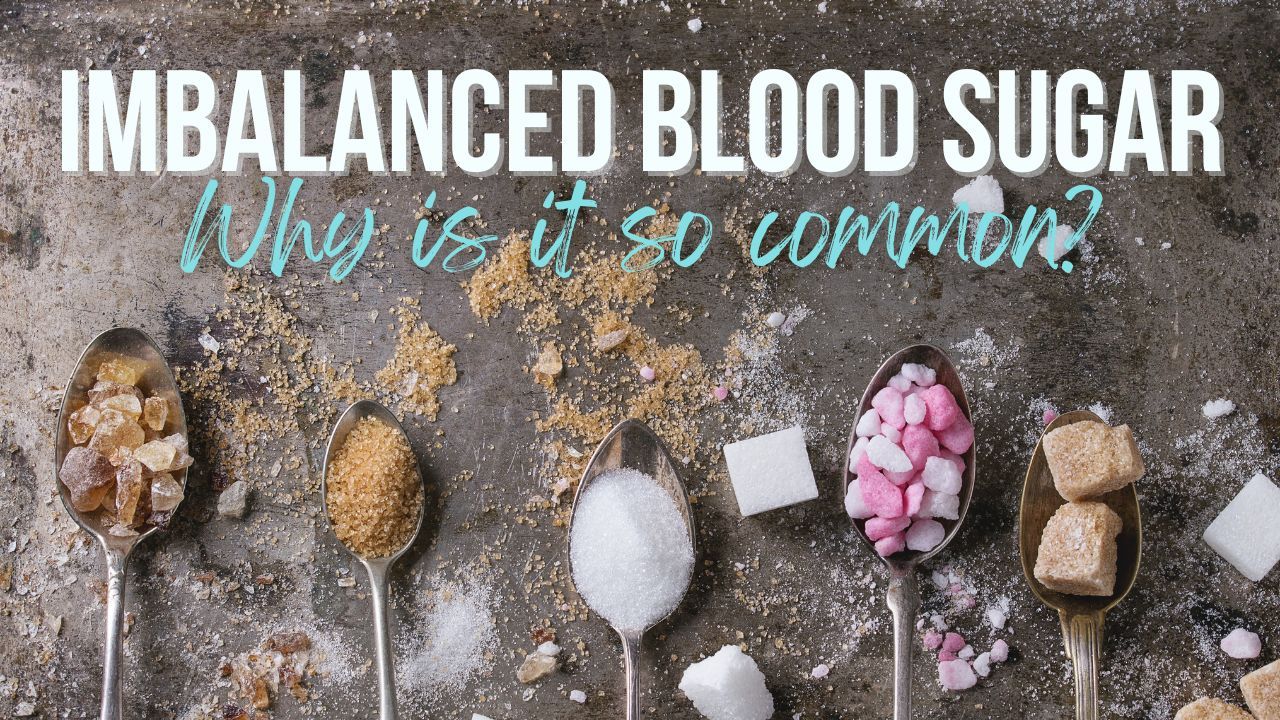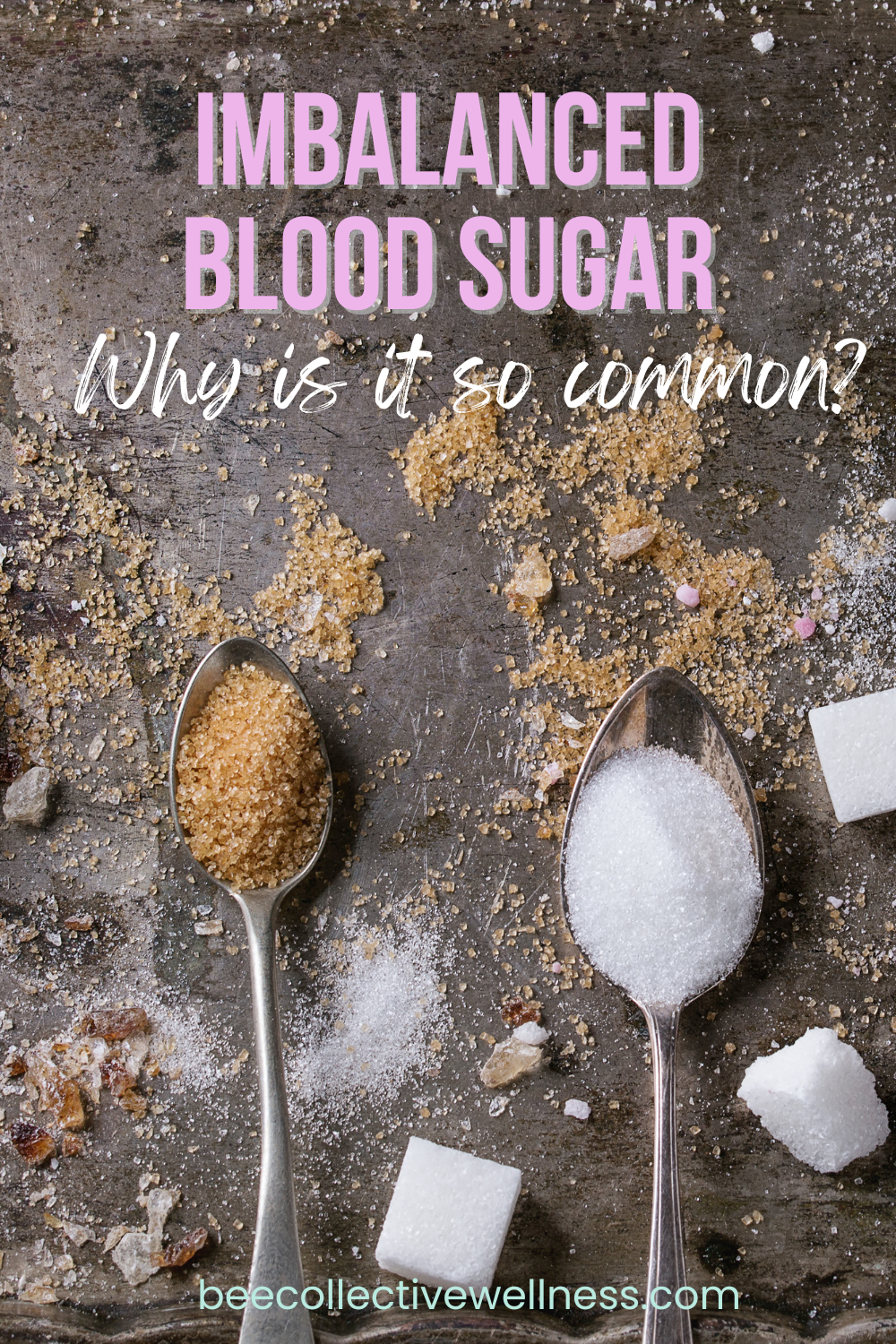
imbalanced blood sugar - why is it so common?
Apr 10, 202349.3% of the US population are either prediabetic or diabetic according to the Center for Disease Control as of 2022.1 Yes, you read that correctly. Almost half of the US population is suffering from imbalanced blood sugar. So why is imbalanced blood sugar so prevalent?
WHAT IS BLOOD SUGAR?
In order to understand what imbalance blood sugar is, you first have to understand what blood sugar actually is.
Blood sugar is the amount of sugar (glucose) circulating in the blood and is the body’s preferred fuel source. Primarily, this glucose is obtained from carbohydrates that are consumed. As carbs digest, they become glucose.
the difference between simple and complex carbohydrates
But the rate at which the carbohydrates are digested down to glucose has a significant impact on how quickly your blood sugar will rise. One factor that influences the rate at which carbohydrates are digested is the classification of carbs - simple or complex.
Simple carbs are monosaccharides (glucose, fructose, or galactose) or disaccharides (a combination of 2 monosaccharides). Whereas complex carbs are polysaccharides (a combination of mono- or di- saccharides linked together).
Complex carbohydrates are also a source of fiber and fiber is essential for gut health. It remains undigested until it reaches the colon where it is digested by bacteria and forms short-chain fatty acids.
When simple carbohydrates are consumed, the carbohydrate become glucose much faster than when complex carbohydrates are consumed.
the relationship between blood sugar and insulin
Now that your carbohydrate has been digested and is glucose, your blood glucose level begins to rise. As glucose levels rise in the blood, the pancreas releases insulin.
Insulin shuttles glucose from the bloodstream to the cells to be used as energy. If the energy is not needed right now, the excess glucose will get stored in the liver and muscles - AKA the glycogen stores. If the glycogen stores are full, the body converts the insulin to a triglyceride and stores it in adipose tissue.
The body will burn the stored glycogen or tap into fat for energy between meals, while sleeping, and while exercising.
However, if insulin levels are elevated, the body cannot tap into fat to burn as a fuel source. The body relies on only burning glucose as fuel, decreasing metabolic flexibility.
what causes imbalanced blood sugar?
Now that you understand what blood sugar is and the role that insulin plays, let’s talk about one of the biggest contributing factors to imbalanced blood sugar - diet.
The Standard American Diet (appropriately abbreviated to SAD) is a diet that consists of highly processed and refined sugars and grains, inflammatory oil,s with minimal consumption of fruit, vegetables, and unrefined grains.
To put it simply, highly palatable, processed, simple carbohydrates with minimal nutritional value are all the rage with the Standard American Diet.
And it’s sending your blood sugar on a wild ride.
High blood sugar levels are dangerous to your body. That’s why blood sugar and insulin have a relationship. The body likes to be in homeostasis and it has checks and balances in place to ensure that happens.
But when blood sugar spikes quickly due to the consumption of simple sugar, insulin will rush in quickly as well and cause your blood sugar to crash quickly.
Just as the body does not like blood sugar to be too high, it also doesn’t like blood sugar to be too low. And that’s when the sugar cravings kick in. Your body is literally on a blood sugar roller coaster, trying to find its happy place.
other things that cause imbalanced blood sugar
While dietary choices are the primary reason why imbalanced blood sugar is so common there are other factors that can contribute to the dysregulation of glucose. Here are a few reasons:
-
Stress
- Stress raises cortisol to prepare the body to “fight or flee” a threatening situation. The rise in cortisol triggers the liver to create glucose (gluconeogenesis) and release it into the bloodstream. This glucose is meant to provide fuel for your cells as you flee from the threat.
-
A sedentary lifestyle
- When you move your body, your body is utilizing any glucose that is currently available or tapping into the glycogen stores. Movement helps your body utilize glucose instead of storing glucose
-
Illness
- Overcoming an illness requires a lot of energy. As part of the body’s defense mechanism for fighting illness and infection, more glucose is released into the bloodstream.2
-
Dehydration
- Water helps to move things out of your body, including excess glucose. Aim to drink half of your weight in ounces of water every day.
-
Hormonal fluctuations
- Estrogen and the estrogen receptors (ERs) are well-known regulators of several aspects of metabolism, including glucose and lipid metabolism, and impaired estrogen signaling is associated with the development of metabolic diseases.3 In perimenopause and menopause, estrogen levels can start to decline, which can further increase the risk of blood sugar imbalances during those years.
overcoming imbalanced blood sugar
The great news is that imbalanced blood sugar can be reversed! There are easy and actionable steps to take that can improve your blood glucose and insulin levels.
Dietary emphasis should be placed on whole, unprocessed foods, including those that are rich in protein, healthy fats, and complex carbohydrates. Additionally, lifestyle changes can have a significant impact on healthy blood sugar levels. You can download a free Healthy Blood Sugar Guide that includes 8 actionable steps to improving blood sugar dysregulation.
References:
1. https://www.cdc.gov/diabetes/data/statistics-report/index.html
3. https://pubmed.ncbi.nlm.nih.gov/21511884/

are you overwhelmed by the conflicting information regarding health, hormones, nutrition, and weight management?
Join me once a month for a FREE "Ask Me Anything" live Zoom sesh! I'll answer all the questions you've been spending so much time searching the internet for.








